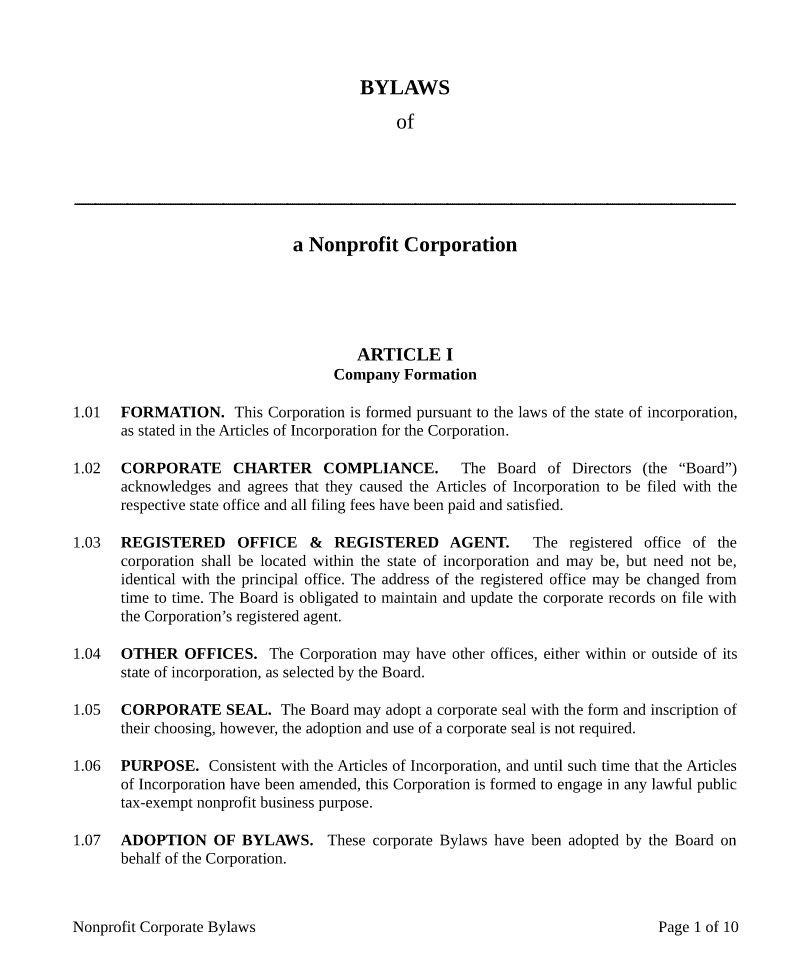Indiana Nonprofit Bylaws
Indiana nonprofit bylaws are internal rules nonprofits use to govern their daily practices and processes. They range in content from how to take a vote to how to amend the bylaws themselves. Bylaws can give a sense of order and control to your nonprofit, making them one of the most important internal documents a nonprofit corporation can have.
Take a look at our attorney-drafted template to help get you started writing your own nonprofit bylaws.
Why does an Indiana nonprofit need bylaws?
Your Indiana nonprofit bylaws are important for several reasons, from offering third parties proof of your corporation’s existence to keeping internal operating processes running smoothly. Though you might think bylaws are less important than, say, your Indiana Articles of Organization, bylaws are a fundamental formation document. Here are a few reasons why your bylaws are so important:
1. Nonprofit bylaws are legally required in Indiana.
Bylaws are required by the state of Indiana. According to IN § 23-17-3-8, the “board of directors of a corporation shall adopt bylaws.” In order to stay in compliance with the law, you will need to adopt bylaws.
2. Third parties will ask to see your bylaws.
Your nonprofit bylaws are technically an internal document, but there are a few times in your nonprofit’s life when you might be required to share them externally. Donors might ask to see them before committing to funding, your bank might require them as proof of existence before you open a business bank account, and—most importantly—you will need to share them if you apply for 501(c)(3) tax-exemption status with the IRS.
3. Nonprofit bylaws allow you more control over your nonprofit.
Without clear bylaws, disputes are more likely to occur. Your bylaws work as a guidebook for your board of directors that help prevent miscommunication and internal disputes. If your nonprofit does face a dispute and there are no bylaws in place, the state of Indiana could step in to settle things. This takes the control away from you and your nonprofit.
Want to learn more? Check out our Guide to Nonprofits.
What do Indiana Nonprofit Bylaws include?
Bylaws for Indiana nonprofits offer the board of directors a how-to manual on running the corporation. This should include basic information about the business, like address and purpose, as well as changes within you nonprofit, like adding new board members.
Your bylaws should provide a comprehensive guide on things such as:
- removing and adding board members
- holding board meetings
- handling conflicts of interest
- record keeping
- compensation for directors
- emergency procedures
- voting procedures
- dissolution procedures
And more! Your bylaws can include anything that your incorporators—or later, you board of directors—feel is important, as long as your bylaws do not go against state statutes.
Are nonprofit bylaws legally binding?
Yes. Bylaws are legally binding as soon as your board members adopt them at the first organizational meeting. If your nonprofit or someone working on behalf of your nonprofit goes against your bylaws, you could face legal consequences.
Are nonprofit bylaws public record?
Sometimes. Nonprofit bylaws are an internal document. But if your nonprofit decides to apply for 501(c)(3) tax-exempt status with the IRS, a copy of your bylaws will be included in that application. The application, with your bylaws, will then be made public.
FAQs
No, your bylaws will be legally binding regardless of whether or not your board members sign them. We recommend having your bylaws signed—this is just standard practice, and adds a layer of protection, ensuring that everyone on your board starts off on the same page.
Absolutely! You will likely need to change the bylaws as your organization grows and changes over the years. The process for how to amend or add bylaws should be included in the bylaws themselves.
Your board of directors or incorporators will adopt the bylaws at your first organizational meeting.
